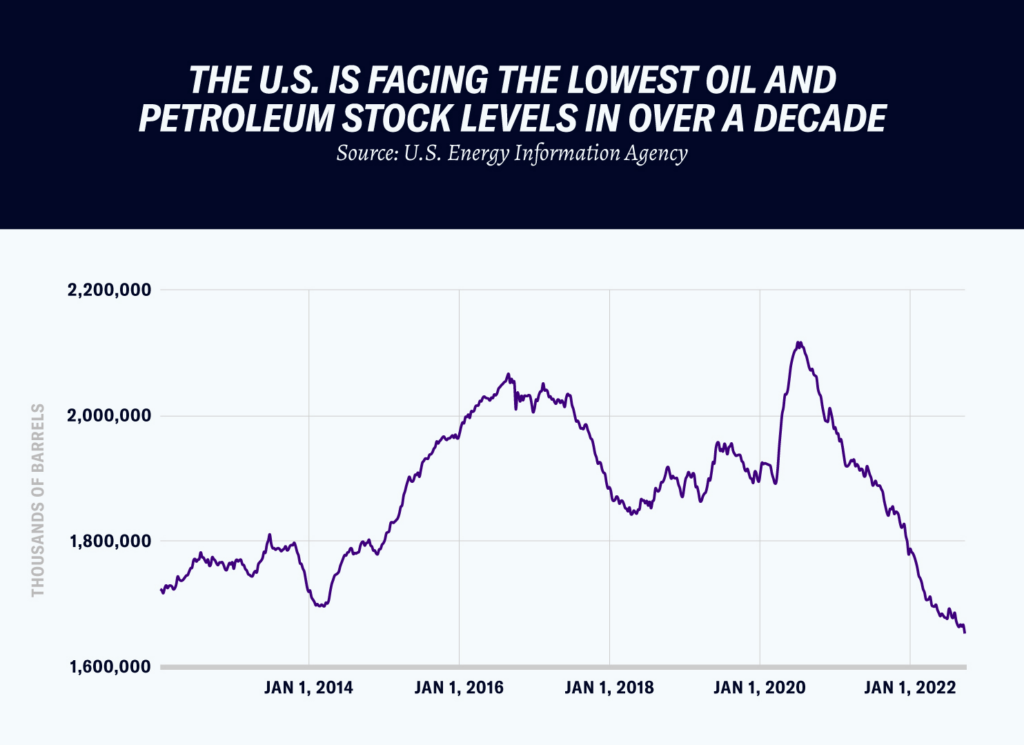Energy giant Exxon Mobil Corp. is protesting one of the Biden administration’s moves to drive down gas prices: reducing the amount of U.S. fuel that’s shipped to customers overseas.
In a letter this week to the Energy Department, Exxon pushed back against the idea that it should be limiting fuel exports abroad to help lower gas prices in the U.S., where oil and petroleum stocks are at their lowest levels in years. Instead, Exxon CEO Darren Woods argued that the administration should embrace free market policies to help ease oil shortages in America.
Exxon management has good reason to push for a hands-off approach: what’s best for the oil industry isn’t always what’s best for the country. In the last 12 months, Exxon generated nearly $39 billion in profits while consumers faced surging costs at the pump. Thanks primarily to high gas prices, the company has paid out over $21 billion to investors through dividends and stock repurchases. At the same time, Exxon significantly pulled back spending on capital investments like refineries—reducing overall capacity and ultimately generating higher gas prices in the process.
Still, Woods insisted in his letter to the administration, “Free market incentives remain the most efficient way for the industry to address” any potential energy shortages in America.
Faced with $5 per gallon gas, the Biden administration has used or explored a range of policy options to stabilize America’s energy supply, including export controls. Gas prices fell for a record 91 consecutive days beginning June 14, but have ticked up in the past week.
In August, believing the East Coast did not have enough inventory for hurricane season, the administration urged oil companies to voluntarily reduce oil exports and divert additional supplies to the region. “The data clearly shows,” Energy Secretary Jennifer Granholm said, “there has not been sufficient progress in building inventories ahead of peak hurricane season.”
As of September 23, U.S. crude oil and petroleum stocks are down 10% compared to the previous year, and 14% from pre-pandemic levels.

It Was Once Common for the Federal Government To Restrict Oil Exports
- In 1975, faced with raising gas prices, President Ford signed the Energy Policy and Conservation Act of 1975. The law increased the domestic oil supply by banning crude oil exports unless approved by the U.S. Department of Commerce. No exports to countries outside of North America ever received authorization.
- In 2015, “as part of a grand bargain that includes tax breaks for renewable energy companies and refiners,” President Obama repealed the law—allowing American energy companies to export without limits.
The U.S. Is Now a Net Exporter of Oil
- In 2018, the United States started to export more oil and refined fuels than it imported. The occasion marked a “symbolic milestone that would have seemed unthinkable just 10 years ago.”
- Overall, Crude Oil and Petroleum Product exports have increased by 80% since 2015.
The Export Ban Helped U.S. Consumers
- A 2019 analysis by the Government Accountability Office found that the 2016 repeal allowed domestic producers to charge higher prices relative to foreign oil.
- A 2022 article in the Wall Street Journal argued that low inventories, driven primarily by fuel exports, generated high gas prices for consumers.



